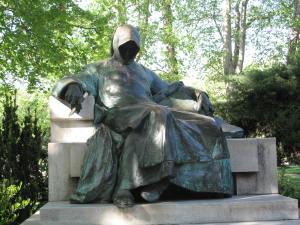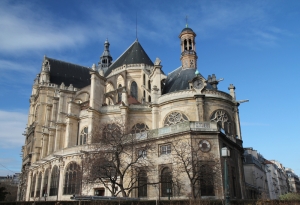
(This is my first attempt to literary glory at age 16. I just translated in English. I hope you will enjoy it).
The Man Dog.
I
After his wife died Gipo was alone. But it wasn’t until after the funeral that he was able to embrace solitude. During those first unreal days he had, for the first time in his life, felt truly important. All his friends (few) and relatives (too many) were trying to outdo each other in the attention and consolation they gave him.
It was a few days before the gravesite would be ready so that the heavy mahogany casket was placed in its final waiting room at the cemetery that Gipo went through a liberating experience. In that surreal room, were tears flowed and took with them the pain of regret, of love, where his feelings traversed the entire rainbow of sentiments from hypocrisy to desperation, Gipo was sure that his life would change. But he had not idea how much.
During the burial everyone was mute. Gipo thought they must have run out of ideas and words to consol him. Good!
The eulogy was finally coming to an end. Soon the curtain would drop, the actors take their final bows and leave him in peace. He was glad.
The last few moments at his doorway were the worst. He couldn’t get rid of them. The last advice, phony entreaties to be called at any time, for any reasons…and finally the door closed on the people of his former life.
Gipo was about to start his new life. Alone. Free.
He leaned with his back against the door and gazed down the long corridor of his apartment. A few moments passed. Gipo stood quite still; he didn’t know what to do. Sure, everyone had promised to call on him, but he knew they wouldn’t. Even when his wife was alive they rarely received visitors or invitations, nor did they go visiting or extend invitations. This wouldn’t change. Not now.
Finally he moved away from the door. He walked down the long hallway into the kitchen. He decided to have an espresso. He fussed with the coffee pot for a bit, got the stove lit after two or three matches, sat down, stared fixedly at the apparatus and patiently waited.
The neon lighting (which his wife had had installed for reasons of economy) cast a disconcerting glow in the room. He hated that light, it was like if he was still at the morgue. Gipo gave a sudden start as the coffee pot began to rumble like a thunderstorm heard in a distance, signaling that it was ready. He inhaled deeply as he poured the ebony liquid into a small cup. The aroma and taste of coffee were two things he couldn’t resist.
Gipo noticed that strangely enough, he wasn’t thinking much about his wife and her loss didn’t cause him any grief at all. Instead he thought of how he wouldn’t have to suffer her reprimands, her sarcasm and her constant gossip on any and every subject anymore. He felt almost happy. It had been a long time since Gipo had felt anything like happy. And maybe best of all Gipo wouldn’t have to put up with the vast array of wheezing, rasping, rattling and other noises she made every night. It seemed that in whatever position she slept, indecent sounds were emitted through every orifice of her body.
Finishing his coffee, Gipo lit a cigarette. With joy he thought how he could now smoke what, when and how he wanted. And if the curtains stank of tobacco, well: he didn’t care. With the last puff on his smoke Gipo admitted that he was happy his wife was gone. He was a widower. “A happy one” he confessed to himself surprisingly without guilt.
He put on his cap and went out.
II
Of all months, November was somehow the saddest. It wasn’t cold but the damp air made him shiver just the same. He adjusted his scarf and then remembered it had been a gift from his wife. He tore it off and tossed into a trashcan.
He felt warmer.
He walked slowly, watching with childlike wonder the mist formed by the contact of his breath with the humid nocturnal air. The long boulevard was deserted. The naked trees stood like giant prisoners with their feet chained to the earth. The pavement was wet and sticky despite the lack of rain and the white light of the street lamps did not seem to penetrate and win against the dim evening. Occasionally a car raced down the street, came down to the corner going too fast and managed to stop only with a squealing of brakes and frantic downshifting.
Gipo looked at the piles of garbage overflowing from the too few containers on the roadside. He thought that even if his city was one of the most beautiful in the world, it certainly wasn’t one of the cleanest. A bunch of cats were intent on the feast in the pile of rubbish. When they heard Gipo’s steps they turned to look. Like two tiny green lights their eyes were focused on the walking man for an instant. Then they turned back to the business at hand.
At the end of the road Gipo saw a light. It was an all-night coffee bar. Going in, he asked for a coffee. Lazily, the man at the bar fiddled with the machine, slid a cup under the spout and waited. Gipo looked around. It was a dark and squalid place. He drank the coffee, which was horrible, asked for a glass of water to wash the taste from his mouth, paid and left.
A big dog was standing just outside the door. It seemed to have been waiting. It stared at him. Gipo always liked dogs very much. But his wife had never allowed one. “They are SOO dirty!” she would wine in her nervous and acidic voice. Well, now that she was gone, he was the master of the house and if he wanted a dog, who was going to stop him?
He stretched out his hand and caressed it on its head. The dog was docile and let him do it.
So Gipo’s solitude only lasted a short time. Now he had a friend. Didn’t they always say that a dog was man’s best friend? They became virtually inseparable, and Rey (the name Gipo gave him) was an exceptional dog; he never barked, never got in Gipo’s way. Didn’t make the apartment dirty. In short, he had all the qualities that a man could hope to find in a dog. At the same time Gipo had all the positive traits a dog could wish for in a man; he was a good man, never demanding, gave him plenty of food, was punctual in talking him for walks. You know how it is… certain beings seem to be made for each other. With the passage of time the man and the animal grew even closer. Gipo could speak for hours to Rey; Rey always listened.
But one day something extraordinary happened.
Gipo was in the armchair, watching TV. Rey lay at his feet, dozing placidly like only dogs can do it. Then, as he often did, Gipo began to talk to his dog.
“…You see Rey, if you could speak, you’d be perfect, not like my wife who could speak but had none of your good qualities. I sure was lucky to find you that night…”
“…I was lucky too, to find you, Gipo…”
For a moment Gipo felt he had followed his wife to the otherworld. Where did that voice come from? Dogs don’t talk!
“…don’t flip out old friend, it is really me, your dog Rey that’s speaking to you; you see, you humans have always thought that we dogs can’t talk, but you’ve always been wrong…”
“…But…but…dogs bark…” Gipo murmured in a trembling voice
“…It’s you humans that say we bark and you speak but from our point of view, we speak and you bark…”
Gipo couldn’t accept what he was hearing. “…I must have had too much to drink or I am going crazy…or maybe…I am just dreaming…Yes, that’s got too be it. It’s a nightmare…”
“…Nightmare or not dear Gipo, it’s true that I am talking to you and you are listening to me. You are not the only one. It happens from time to time…”
“…What happens?…” asked Gipo.
“…Well, have you ever seen a dog that remind you of someone you once knew?…”
“…Yeah…so?…”
“…You see…those aren’t actually dogs…they are mandogs…”
“…Mandogs! What does that mean?…” demanded Gipo, beginning to panic about what was happening.
“…it means that certain men, like you for example, that are particularly good to dogs can, in turn, become dogs, but can still talk to human if they want to help them become other mandogs too…”
“…You mean you were once a man…?”
“…Exactly…I was an accountant in a small village. I was alone. The society of men had cast me out, or at least I was never considered by other people but amongst the dogs I am an important fellow, and above all I am not judged…”
“…Oh, my God…”
“…Now Gipo do you want to become a mandog? You will never be alone. There’ll always be somebody to help you, either a dog or a man. We dogs always help each other and we sometimes find help from a human…”
Gipo made no response. He let out a whistle and fell back into the armchair.
Outside, the rain was gently knocking at the window. Sad, lonely drops, begging for help.
A long time passed and Gipo wasn’t seen. One day a niece of his wife’s was out for a stroll with her husband and she pointed out a stray dog to him.
“…Doesn’t that dog look like the husband of my dear departed aunt, God bless her?…”
“…What?…” he replied “…But yes, I guess it’s true. Funny, but out of all men he could look like it would be that half-wit uncle of yours…”
“…He’s not my uncle anymore! Who knows what has happened to him…living just like a dog…”
“…Just like a human…” thought the dog as he turned and trotted off down the street.
“…The only thing I miss is coffee and cigarettes…”


![children-lidice-4[6]](https://attentiallupo2012.files.wordpress.com/2015/04/children-lidice-46.jpg?w=300&h=200)







